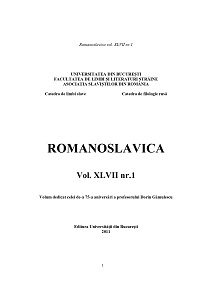Raporturi antroponimice sârbo-române. Criterii şi metode
Serbian-Romanian anthroponymic relations. Criteria and methods
Author(s): Anca-Maria BercaruSubject(s): Lexis, Historical Linguistics, Comparative Linguistics, South Slavic Languages, Philology
Published by: Editura Universităţii din Bucureşti
Keywords: masculine names; Romanian influence; Serbian influence; anthroponymical borrowings; structural elements; internal etymology;
Summary/Abstract: The Serbian and Romanian systems of proper names influenced each other over time within the frame of the numerous contacts that took place between the Romanians and the Southern Slaves. In the present article we submitted to analysis a series of masculine derivatives from Serbian and Romanian whose structural elements may indicate their Slavic or Romanian origin. In the first part of the article we analysed the masculine forms from the Romanian inventory of names that are likely to have been borrowed from Serbian, while in the second one we analysed masculine derivatives from the Serbian anthroponymy that indicate the Romanian influence on the Serbian system of names. The first task turned out to be a difficult one because the formal identity between the Serbian and Bulgarian inventory of names poses difficulties in establishing with certainty anthroponymical borrowings from Serbian. Taking into consideration the principle of internal etymology which leads to determining the denominative subject, we selected a series of masculine forms that are created from the anthroponymical theme Bal- in order to illustrate the complexity of this type of analysis. Thus, names like the Romanian Balea or Balotă could be analysed in two ways: we could regard them either as phonetic adaptations of the Serbian or Bulgarian name Balja, respectively the Serbian Balota, or as derivatives with the suffixes -ea, -otă from the theme Balwhich was assimilated by the Romanian linguistic system and used by the Romanian population for the creation of new names. The Romanian historical anthroponymy also contains a series of masculine names which come from Slavic hypocoristic forms created from vowel themes or from themes extracted from compound names. The extraction of vowel themes in order to create new hypocoristic forms or derivatives is a process characteristic to the Slavic languages. In Romanian this type of names constitute borrowings. We illustrate this with the following examples: Boia (compare to the Serbian name Boja < Bogoslav, Borisav created from the vowel theme Bo- with the suffix -j-); Goia (the Serbian Goja < Godimir, Gojislav); Raia, Raşa (the Serbian Raja, Raša < Radomir, Radoslav, derived with the suffixes. -j- and -š-; Peia (the Serbian Peja < Petar, derived with the suffix -j-); Stoia (the Serbian Stoja created from the theme Stoj < Stojimir, Stojislav); Vlaia (the Serbian Vlaja < Vladimir, Vladislav, derived from Vla- with the suffix -j-); Voia (the Serbian Voja created from the theme Voj- < Vojimir, Vojislav). The Romanian influence on the Serbian anthroponymy is much smaller, has a more stable character and is easier to be localized in time. The earlier contacts between the Serbian and Romanian anthroponymy have the advantage of being very well illustrated in the Serbian medieval chrysobulls. The chrysobulls from Banjska, Deţani and Prizren show that the Romanian population was secondary to the Serbian. Some of the names comprised in the lists that mention the Wallachs come from common words of the Romanian language of Latin origin (Bun, Mikul, Singur) and many of them contain the suffix -ul which corresponds to the Romanian definite article. In principle, the historical anthroponymy of Serbia contains the following masculine names created with the suffix -ul(a): Bogdul, Bratul, Bratula, Dajul, Dojul, Dragul, Dušul, Gradul, Hrajul, Hranul, Mikul, Mutul, Něgul, Oparitul, Radul, Rahul, Rajul, Rašul, Stajul, Stanul, Surdul, Šarul, Vladul. The names from the Serbian inventory that contain the suffix -ul and exist in the same form in Romanian could be considered correspondents of the Romanian names. It is very likely that from old names like Radul and Vladul the Serbian population detached the suffix -ul and used it for the creation of other names that exist in the Serbian onomasticon such as Bojkul, Dobrul, Ţivul. Determining the denominative subject on the basis of structural elements has a significant importance in onomastics because it offers us precious information regarding the influence that the Serbian and Romanian systems of names exercised on each other over time.
Journal: Romanoslavica
- Issue Year: XLVII/2011
- Issue No: 1
- Page Range: 17-26
- Page Count: 10
- Language: Romanian

